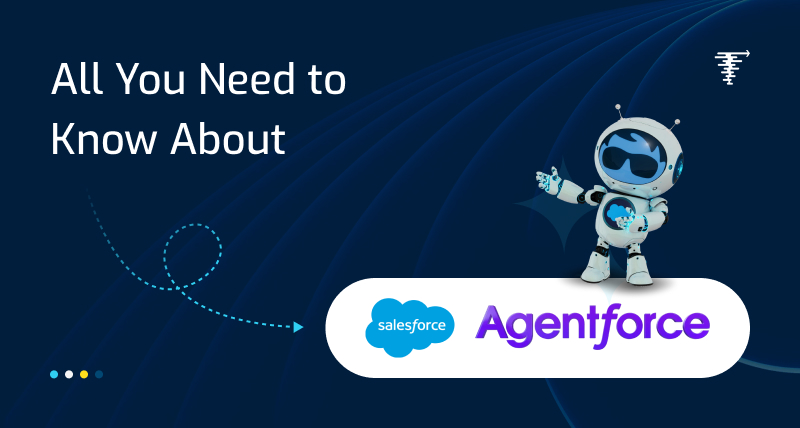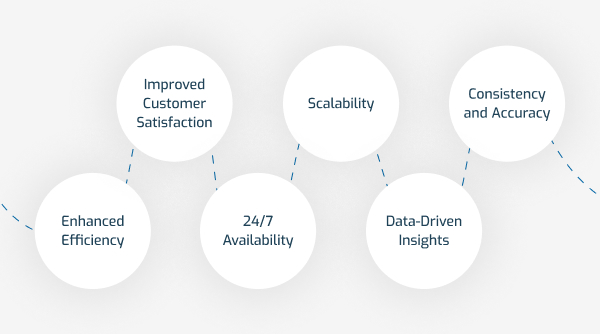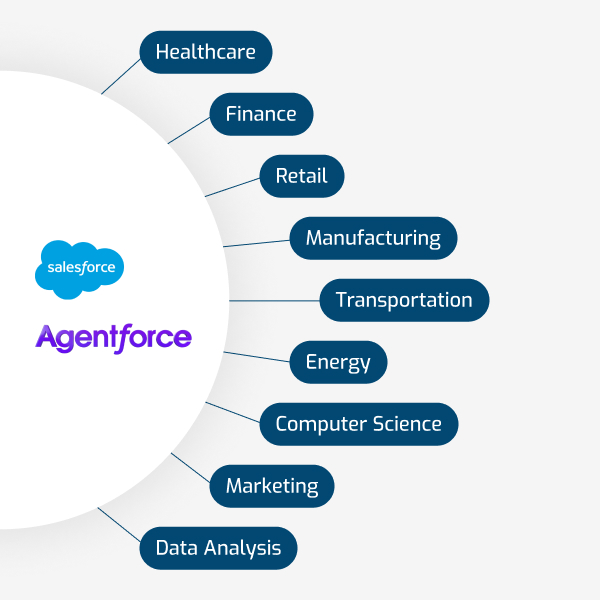

Gone are the days when you needed to make multiple calls to customer support just to resolve one query. It's the era of innovation and new technology. Enter Agentforce, an AI-powered virtual agent was unveiled in Dreamforce 2024. This AI agent helps you manage customer inquiries, streamline tasks, and keep your business running effortlessly around the clock.
According to a Salesforce research report, almost one-third of consumers prefer interacting with AI agents for instant solutions. And around 34% of businesses would opt for AI to avoid the frustration of repeating themselves during customer support.
However, keeping user preference in mind, Salesforce has aimed to deploy almost one billion AI agents by 2025. This creative approach not only redefines customer engagement but also ensures a more personalised service beyond the traditional LLM-based chatbots and customer support solutions.
This blog talks about the Salesforce agentforce and how it refines customer service in every industry with a focus on its benefits, use cases and new version. Read on to learn more!
Salesforce Agentforce is the suite of tools and capabilities within the Salesforce Service Cloud intended to streamline customer service operations by equipping agents with AI-powered automation, omnichannel customer support, and a centralised workspace. Not only this, but it allows agents to handle cases efficiently, engage with customers across multiple channels (chat, email, phone, and social media), and have a knowledge base readily available for instant issue resolution.
Through smart case routing, real-time analysis, and automation, Agentforce facilitates faster response times, increased agent productivity, and better customer satisfaction.
Read Also: Stop Coding, Start Creating: Build Your Custom App in Salesforce
Leveraging AI agents in customer service has several benefits. It completely transforms how businesses collaborate with:

Salesforce AI agents process different interactions with multiple customers all at once, clearly reducing response times and adding user account management capabilities. Also, it enables enterprises to handle various inquiries without even compromising with the quality of customer service.
These AI agents give quick and accurate answers to customer queries in no time, resulting in increased customer satisfaction ratings. With data, they can personalise interactions and improve the overall customer experience. And since they learn continually, they're poised for continuous improvement.
In contrast to most human agents, these Salesforce AI agents are always accessible, allowing for customer questions to be answered anytime, without concern for time zones or business schedules. This endless availability enables businesses to fulfil customers' expectations of self-service as well as increase customer loyalty.
AI agents have exceptional quality and capabilities to manage multiple customer interactions simultaneously. However, it is a suitable and most apt solution for businesses looking to grow without compromising service quality. Even as the volume of cases grows, AI agents can be easily tweaked to manage the added load and ensure reliable and consistent support.
AI agents create useful information on customer interactions, tastes, and behaviours. Companies can leverage this information to understand customer needs, buying patterns, and trends to deliver them the more personalised user experience, make sound decisions, and enhance their service offerings.
Consistency builds trust and confidence in the brand. Salesforce AI agents deliver accurate information and answers to customer questions, minimising the chances of errors and providing customers with dependable information.
In a nutshell, AI Agents bring many benefits including higher productivity, less expense, smarter decisions, and more personalised experience. According to McKinsey research, "over 72% of companies surveyed have already been using AI solutions with growing interest in generative AI. It would be less surprising not to expect business corporations to introduce frontier technologies like agents to plan agendas and forthcoming AI roadmaps.
By employing these cutting-edge AI technologies, companies can remain at the forefront and influence customer engagement innovation. Now let’s understand how exactly Agentforce work for various industries in the next section.
Related Blog: Zoho CRM vs. Salesforce
Salesforce Agentforce enables organisations to create and handle autonomous AI agents to streamline business tasks and operations for various departments. There are various building blocks including technologies, channels, topics, and actions to configure the agents when creating Salesforce.
One of Agentforce's standout features is its integration with Atlas Reasoning Engine which enables users to rigorously test agent performance and capabilities before deploying them in real-world. This process not only ensures agents are fully functional but capable of managing complex tasks effortlessly.
Additionally, the Omni Supervisor tool offers comprehensive monitoring capabilities to track agent activity in real time, assess performance metrics, and make informed adjustments as needed.
However, the Data Cloud and Atlas Reasoning Engine synergy improves Agentforce's functionality, enabling more subtle decision-making and powerful data analytics. Through this synergy, the AI agents are not just automated systems but intelligent beings with the ability to learn and improve over time, ultimately leading to improved business outcomes and driving innovation within the organisation.
By integrating Salesforce Agentforce into your business, you can leverage the AI capabilities to enhance productivity, enhance customer engagement, and remain competitive in a competitive market.
There area a total of 7 AI agents for Salesforce as of now
Salesforce AI agents respond according to strict rules and have no regard to past experience or future consequences. They are applied in stable environments with well-understood rules.
For instance: Automatic Doors. These agents open when they sense a human entering and close when a resident is not present. They use simple condition-action rules without regard to history.
When compared to simple reflex agent, model-based have an internal model of the world and base their decisions, not only on current input but also on the knowledge of their past states.
For instance: Thermostats. Agents have an internal representation of the current temperature and compare it to a desired target. They control heating or cooling equipment based on this comparison, enabling them to react appropriately to changing conditions.
These agents have the objective of accomplishing something. They consider the outcome of their actions and decide based on whether the actions will assist them in accomplishing their goals.
For instance: GPS Navigation Systems. These agents decide on the optimal path to a given destination by analysing different routes and traffic conditions, constantly refining their suggestions based on real-time information.
They apply a utility function for comparing actions and selecting the action that maximises expected utility, making them particularly suited for problems with numerous possible solutions.
For instance: Recommendation Systems (such as those employed by Netflix or Amazon) - These agents analyse multiple choices based on user behavior and preferences to recommend content or products that best satisfy the user.
Related Blogs: How to Integrate HubSpot with Salesforce in 11 Simple Steps
These agents learn from their experience and modify their strategies based on new knowledge, making it possible to have user-specific and personalised experiences.
For instance: Spam Filters. These agents are trained by user interaction (e.g., labeling messages as spam or not) so that they become better at filtering out unwanted mail over time, refining their criteria through new information.
These agents are organised in a hierarchical structure with higher-level agents controlling lower-level ones, and they make it possible to divide complex tasks into simpler ones.
For instance: Robotic Process Automation (RPA) in business processes. These applications are made up of several agents working together, with higher-level ones arranging for lower-level ones to perform tasks such as processing invoices or handling customer service requests.
These Salesforce AI agents consist of two or more agents, which communicate and cooperate in order to attain shared objectives, they can be homogeneous (comparable abilities) or heterogeneous (varied abilities).
For instance: Online Gaming Environments. In multi-player games, different agents (players and non-player characters) interact and cooperate to reach common goals, each with their own capabilities and roles in the game.
Read Also: Explore how Salesforce CRM can help your business scale
There's no end to the variety of use cases for AI agents. Let's just take a few examples of AI agents across industries to give you an idea of just how universal the agent function can be.

Healthcare
Manging and diagonising patients' history is still challenging for doctors. However, AI agents can assist physicians in diagnosing illness by analysing medical images. They can also create customised patient treatment plans and management records.
Finance
Personalised AI agents can assist banking agencies in fraud detection and offer customers personalised finance suggestions.
Retail
Retail companies can program customer service touchpoints to automate. They can also personalise shopping experiences driven by product recommendations based on AI to maximise or boost company sales.
Manufacturing
Keeping an eye on the production process and available stocks may be challenging, affecting timely deliverables. However, AI agents can be used to monitor equipment, forecast maintenance needs, and streamline production processes for improving productivity and prevent costly downtime.
Transportation
AI agents can drive autonomous vehicles, monitor traffic, avoid safety hazards, and more. Although this is a nascent industry today, it could transform the way we travel.
Energy
Software agents can assist in saving resources by detecting energy optimisation opportunities. They can even control renewable sources such as solar and wind to increase production.
Computer Science
An AI code assistant can assist in code creation and identify and correct errors more quickly. This is time saved for programmers that they can allocate elsewhere in software development.
Marketing
AI marketing agents can forecast customer behavior and decide on the best channels, enabling businesses to develop more efficient, customized marketing campaigns.
Data Analysis
Data science experts can use AI agents to wrangle and classify data for analysis automatically. This gives them more time to focus on drawing insights from the data they possess.
We’re only scratching the surface here. AI agents can benefit every industry in the world, from personal assistants to assembly lines and everything in between.
AI agents have brought an advancement for service organisations to provide personalised assistance at scale. Organisations that have already adopted this technology will be far along the way to reducing costs and meeting the demands of today's customers in a more competitive world market.
However, if you're not one of them and looking to make your website adaptive for these AI agents on HubSpot or Salesforce Consulting with experts like Transfunnel helps you with the right implementation. Their expertise helps you leverage Salesforce platform and unlock the full potential of AI agents for maximum productivity.
Leverage Salesforce to unlock AI agents' potential with us. Connect Today!